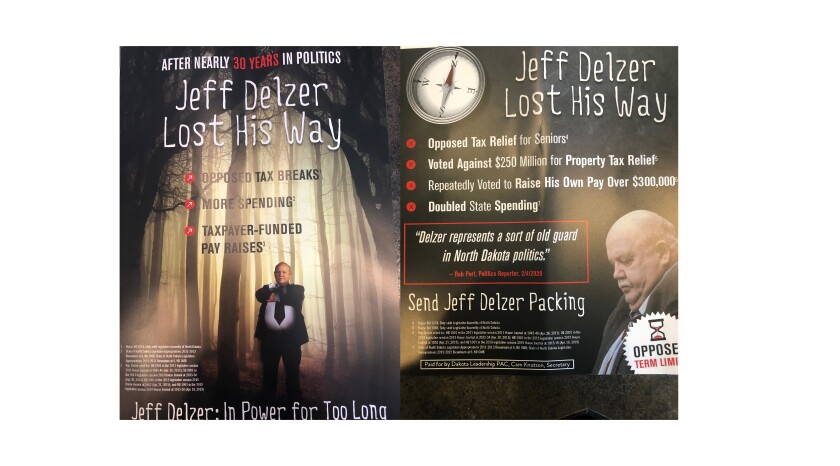BISMARCK — North Dakota senators have killed two bills that would have required political donors to disclose where their money is going, citing a likely increase in the amount of paperwork expected of partisan groups that help elect lawmakers.
Candidates and political committees are not legally compelled in North Dakota to detail which campaigns they are supporting or opposing with donations. A bipartisan group of lawmakers set out to change that after Republican Gov. Doug Burgum bankrolled millions of hard-to-track dollars in political advertising for and against candidates during last year's election cycle.
Rep. Bill Devlin, R-Finley, sponsored House Bill 1191 , which would have required "multicandidate committees," like the Burgum-led Dakota Leadership PAC, to divulge details of their spending, including the amount of money going to each promotional or oppositional campaign. Leaders from both parties signed onto the proposal as co-sponsors, but after sailing through the House of Representatives, the bill died on the Senate floor Tuesday, April 6, with only a quarter of members voting for it.
The upper chamber also nixed House Bill 1496 on Tuesday. The legislation, sponsored by Lisbon Republican Rep. Sebastian Ertelt, would have required a similar level of expenditure reporting for candidates and other types of committees.
In an effort to persuade his colleagues to reject Devlin's bill on Tuesday, Velva Republican Sen. Shawn Vedaa said the current reporting requirements are sufficient and "the multicandidate committees being hit the hardest would be our own caucuses with the extra paperwork." Caucus campaign funds for Republicans and Democrats help preferred candidates win seats in each chamber. Vedaa, for example, received $6,000 last year from the "Republican Senate Caucus," according to filings with the Secretary of State's Office.
ADVERTISEMENT
Sen. Kristin Roers, R-Fargo, urged members to vote against Ertelt's bill, noting that "i t would also affect every caucus fund, every district party disclosure."
" House Bill 1496 is a bill with good intentions, but in the end, it adds a lot of busywork for not a lot of benefit," Roers said.
Untraceable spending
Both Ertelt and Devlin said they submitted their proposals to open up a campaign finance reporting system that lacks transparency.
For Ertelt, the issue is personal. He noticed that two political committees had taken out ads against him on Facebook, but when he looked to see how much the groups had spent in his race, he found nothing. Not being able to track where candidates and groups are shelling out campaign dollars misses the point of financial disclosures, Ertelt noted.
“In certain legislative races where typically the overall (amount of spending) is fairly low, I think it behooves not only the candidates involved but also the public to know if someone is basically coming in to buy an election," Ertelt said. “We should know who and to what extent campaigns or elections are being influenced.”
Devlin said Burgum's massive spending spree last year was front of mind when deciding to put in a bill to reform campaign finance laws. Both he and Ertelt note that the governor is certainly allowed to funnel money into political campaigns, but they think the public should be able to see the receipts.

ADVERTISEMENT
Filings show that Burgum, a former tech executive, streamed more than $3.2 million of his personal fortune into the Dakota Leadership PAC, which spent nearly $3.5 million on advertising last year. A campaign spokesman for Burgum declined to comment on this story.
It’s unknown which races the Burgum-led committee sought to influence or how much it put into the contests, but committee-sponsored fliers in support of then-state treasurer candidate Thomas Beadle and in opposition to Beadle’s opponent, Dan Johnston, and House Appropriations Chairman Jeff Delzer, R-Underwood, landed in residents’ mailboxes during the lead-up to North Dakota’s Republican primary elections.
Many Republican lawmakers, including House Majority Leader Chet Pollert, R-Carrington, have said Burgum's peppering of fellow party members with negative ads strained the relationship between the governor and the Legislature.

Vedaa gave several other reasons to reject the bills, including that candidates already must report what they receive from political committees. However, most of the spending done by the Burgum-led committee is believed to have supported or opposed candidates indirectly because the money doesn't appear on candidates' contribution statements, leaving it virtually untraceable.
Opponents of the bills also noted that the changes would cost the secretary of state about $20,000 to implement. Ertelt chuckled at the suggestion that such a small allocation could derail the proposals.
With the two bills now dead, reform to North Dakota's campaign finance reporting rules probably won't come during this legislative session, but the issue is likely to come back before lawmakers.
ADVERTISEMENT
Senate Majority Leader Rich Wardner, one of only 12 "yes" votes on Devlin's bill, said lawmakers should look to require more extensive financial reporting from political committees but not so much information “that nobody does it.”
The Dickinson Republican said political committees should have to reveal which candidates or causes they are supporting or opposing with their funds, noting that lawmakers are especially concerned about out-of-state groups that use committees as a vehicle to pour money into citizen-initiated ballot measures without disclosing details of their spending. Wardner said he's not in favor of requiring more financial reporting from candidates.
For his part, Ertelt said he plans to bring a similar proposal back in two years, adding that "a nyone who was actually targeted in the last campaign probably has a different opinion" than the senators who shot down the bill over paperwork.









